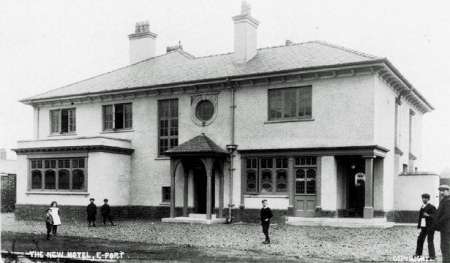Knot Hotel, 51 Whitby Road, Ellesmere Port
GROWTH OF ELLESMERE PORT. PROPOSED NEW PUBLIC-HOUSE. TRUST COMPANY'S APPLICATION. SPECULATIVE BUILDER'S OBJECTION. At the Chester County Police Court, on Saturday, before Mr. John Thompson and other magistrates, Mr. E. Gardner (Messrs. Potts, Potts and Gardner) applied on behalf of the Cheshire Trust Co. for a licence for a new public-house to be erected by the Trust Co. on the Whitby-road, Ellesmere Port. Mr. Gardner said the Trust Company were not doing this to extend their business or to increase the existing number of public-houses, but to provide for the requirements of a growing district. He thought he was justified in saying that the public-house was badly wanted in this district of Ellesmere Port, as the existing licences were not convenient- for the people living in the direction of Whitby. Besides a growth in the population, there had been some works erected belonging to the Wolverhampton Corrugated Iron Works. There were already 400 workmen employed at the works, and as the latter were to be enlarged, double the number of workmen would within a short time be employed there. During the last two years 230 new houses had been built, and the population had increased by 1,300. Those increases were still going on, and at the present time there was only the Railway Hotel near the station for the accommodation of the population in that district. It was also very inconvenient for the people of the district, where the proposed public-house was to be erected, to go to the Railway Hotel, as they had to cross the railway by the level-crossing, which was frequently blocked, or go under a subway, which was very objectionable. The other public-house at Whitby was situated 900 yards away from the site of the proposed new public-house, and the Railway Inn was 377 yards distant. The whole question as to whether a new public house was wanted was gone into at the last annual licensing meeting, and he (Mr. Gardner) understood that the bench had come to the conclusion that another licence was required. The Trust Company did not press the, application, but they did think a new licence was required. The site was suitable and suitably situated in every respect. The Chairman: It is a site that commends itself to us, and the workingmen going to or coming from the works would pass the house. The bench wants to improve the character of all these houses. Is this not very much like an hotel? Mr. Gardner: I am inclined to think it is rather elaborate, but we had to get these plans out at a very short notice. The Chairman: Of course, the better it is the more it commends itself to the bench, but does it commend itself to the customers? Mr. Gardner agreed that the plans could be modified, and would be so if the bench desired. The company intended to spend a lot of money on the house. The Chairman: The question is whether this is a workingman's house. They have peculiar notions. Mr. Gardner: We want to improve the surroundings altogether of these men, and our idea is to make a nice garden or Bowling Green at the back of the public-house. In answer to the Chairman. Mr. Gardner said the company would agree to pay £10 a year as monopoly value for five years, and £20 a year afterwards. Evidence in support of the application was given by Mr. E. Peter Jones, director of too Corrugated Iron Works, who said there were more than 400 men employed in the works, and about £700 a week was paid in wages. Additional works would be completed by June, and blue number of workmen would then be about 700. In answer to the magistrates. Mr. Jones said the work was very trying and hot work. They were highly paid, and they had a lot of money to spend. The Chairman: They part with a lot of moisture. and they must replace it. (Laughter) He thought a new public-house was necessary, and the opportunity of providing one should be given to the Trust Company. Evidence in support of the application was given by Richard James, Isaac Taylor, and others. Mr H. Beswick, who explained the plans, said the building would cost £2,500 exclusive of the land. The latter would cost £ 420. … After a short retirement, the Chairman said the Bench had decided to grant the provisional licence, subject to confirmation by the next Court, and to the plans being altered so as to meet the requirements of the police and the approval of the Bench. The monopoly value would be £10 a year for five years and £20 afterwards. [Cheshire Observer 9 March 1907 page 8]
